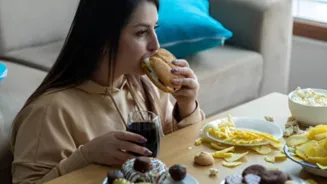When we think of binge eating, the first assumptions often lean toward greed, gluttony, or a lack of willpower. But as mental health professionals point out, the truth is far more complex and far more compassionate.
Binge eating, they say, is less about the stomach and more about the spaces in life and the heart that feel unfillable.
“Binge eating isn’t about greed, gluttony, or a lack of willpower. It’s about an emptiness that isn’t in the stomach,” explains Mansi Poddar, a trauma-informed psychotherapist. For many, it starts quietly, an extra slice of cake here, a late-night snack there until the food becomes less about flavour and more about the ritual, the rush, and the brief way it fills an otherwise unreachable void.
Clinically, binge eating disorder is defined by consuming large amounts of food in a short time until you’re uncomfortably full, often in secrecy. Sometimes these episodes are meticulously planned with a list of “binge foods” purchased in advance; other times they’re impulsive, where a person realises halfway through a box of pastries that they never truly tasted the first bite. What follows is familiar: guilt, shame, and the quiet vow to “do better tomorrow.”
According to Arpita Kohli, Psychologist, PSRI Hospital, Delhi, this cycle is driven by the brain’s chemistry as much as by emotion. “Food can become a comfort tool because it offers immediate relief. The brain releases feel-good chemicals like dopamine when we eat, especially calorie-rich or sugary foods. For someone who is emotionally distressed, this quick sense of comfort can feel like a lifeline. However, the relief is temporary, and the underlying emotional pain remains, often triggering the cycle again.”
Mansi draws parallels to addiction. “Addiction isn’t just about substances; it’s about the brain chasing reward, escaping discomfort, and seeking chemical comfort. With binge eating, it’s sugar, fat, and salt triggering that same neurochemical relief. Just as someone might drink to numb loneliness or use drugs to silence anxiety, binge eating can be a coping mechanism for unmet emotional needs affection, validation, safety, or even the right to feel joy without earning it.”
The role of trauma is significant. As Arpita explains, “Early experiences of neglect, criticism, or instability can disrupt a person’s ability to regulate emotions. Without healthy coping mechanisms, food becomes a reliable, easily accessible source of comfort. Over time, the habit is reinforced not because the person lacks willpower, but because their mind has linked eating with emotional safety.”
Pop culture has occasionally touched on the issue. Mansi recalls Blair Waldorf from Gossip Girl, “Impeccably dressed, socially untouchable, yet hiding bulimia behind locked doors. While binge eating disorder isn’t exactly the same, the emotional landscape overlaps the need for control in a chaotic world, the secret rituals that promise relief but deliver more self-loathing.”
Both experts agree that breaking free from binge eating requires more than willpower or restrictive diet plans. “Addressing binge eating calls for identifying and working through the root emotional triggers,” says Arpita. “This may involve therapy, learning healthier ways to regulate emotions, building self-compassion, and creating supportive environments that reduce shame.”
Mansi adds, “Recovery begins not with locking the pantry but by asking: What do I need that I can’t ask for directly? Healing is about finding new ways to feed the parts of ourselves that were hungry long before the food ever arrived.”
In the end, the journey out of binge eating isn’t about controlling appetite, it’s about nurturing the self. Because hunger, as both experts remind us, isn’t always about food.














